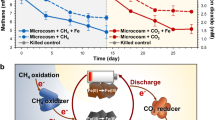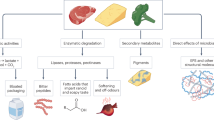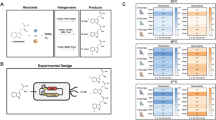Abstract
Koser1 showed that all types of B. coli are capable of growth in a simple medium in which ammonium phosphate constitutes the source of nitrogen, and a fermentable carbohydrate such as glucose or lactose is the source of carbon; when citric acid is substituted for the carbohydrates, growth occurs only with the sub-group known as Aerobacter-Cloacæ. Growth in such medium, called Koser's test, has since become one of the basic criteria in differentiating the Koser-negative E. coli from the Koser-positive members of the Escherichia tribe.
This is a preview of subscription content, access via your institution
Access options
Subscribe to this journal
Receive 51 print issues and online access
$199.00 per year
only $3.90 per issue
Buy this article
- Purchase on Springer Link
- Instant access to full article PDF
Prices may be subject to local taxes which are calculated during checkout
Similar content being viewed by others
References
Koser, S. A., J. Bact., 8, 493 (1923).
Pucher, G. W., Sherman, C. C., and Vickery, H. B., J. Biol. Chem., 113, 235 (1936).
Author information
Authors and Affiliations
Rights and permissions
About this article
Cite this article
LOMINSKI, I., CONWAY*, N., HARPER, E. et al. Utilization of Citric Acid by some So-called Citrate-non-Utilizing Bacteria. Nature 160, 573–574 (1947). https://doi.org/10.1038/160573b0
Issue Date:
DOI: https://doi.org/10.1038/160573b0
This article is cited by
-
Microbial catabolism, the carbon cycle and environmental pollution
Naturwissenschaften (1978)
-
Metabolic differences betweenEscherichia coli cultures growing aerobically and anaerobically in the presence of fluoroacetate
Folia Microbiologica (1966)
Comments
By submitting a comment you agree to abide by our Terms and Community Guidelines. If you find something abusive or that does not comply with our terms or guidelines please flag it as inappropriate.



